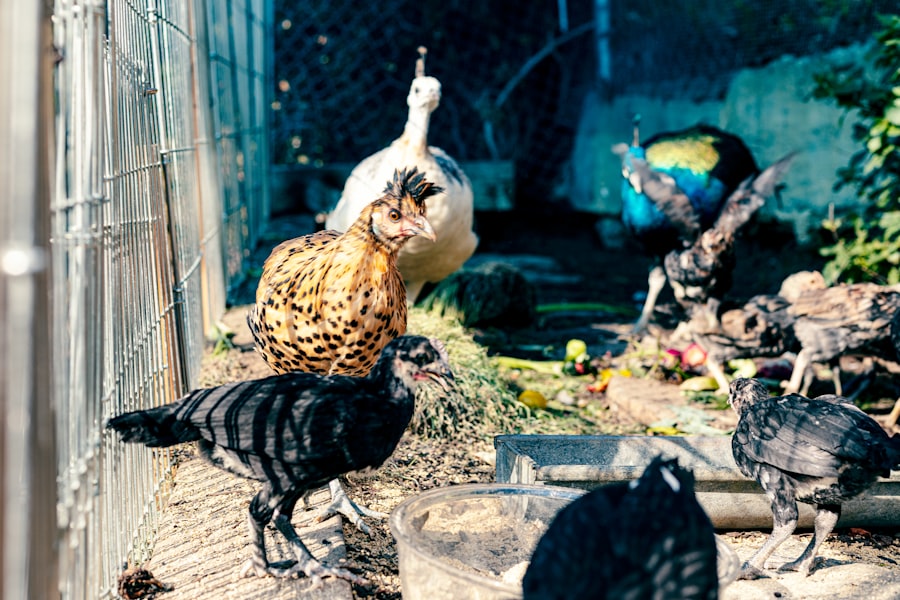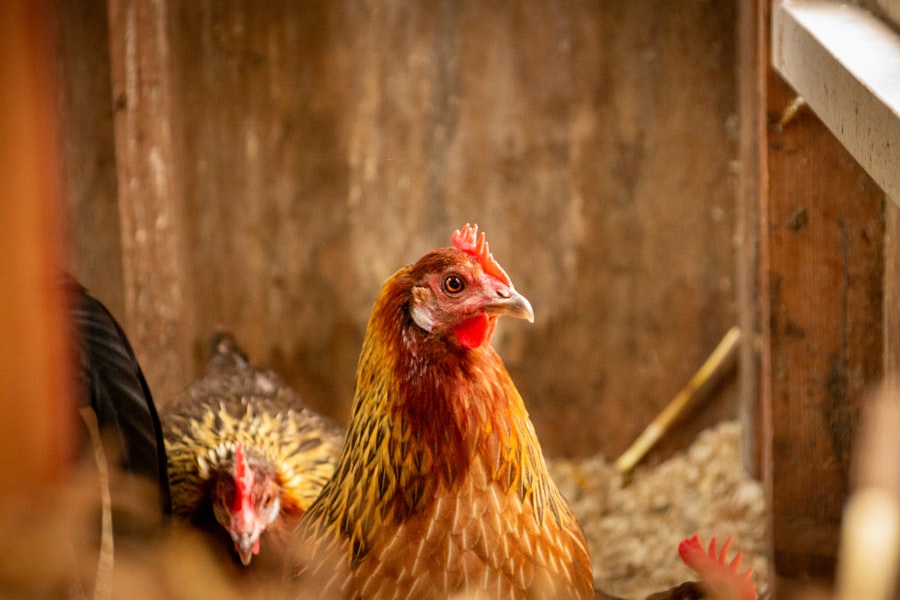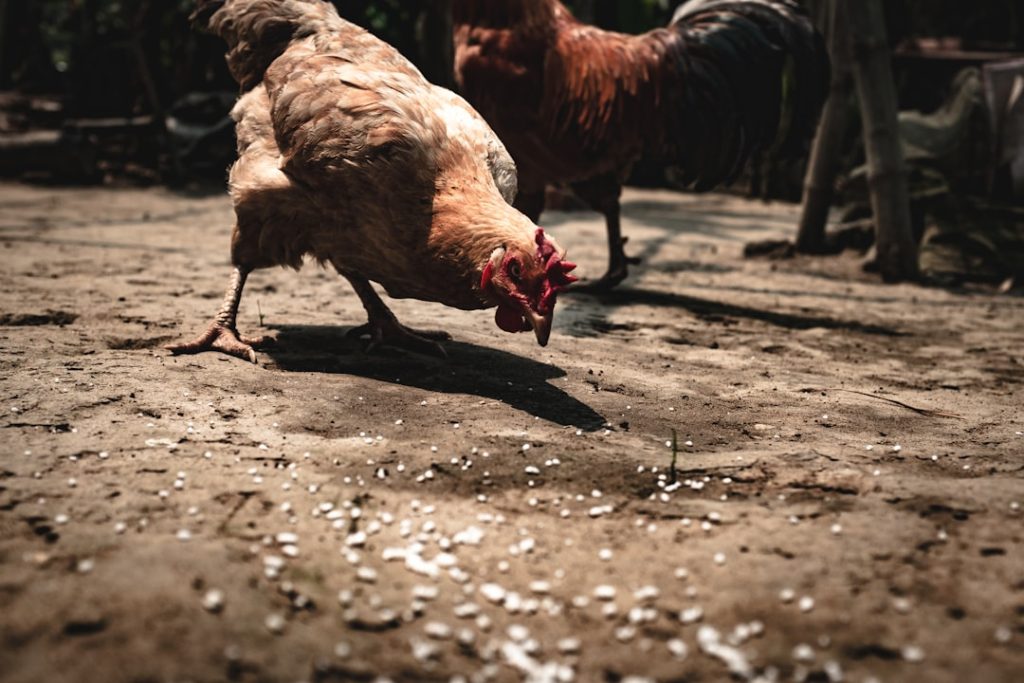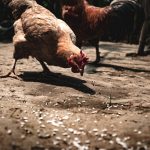Selecting the appropriate chicken breed for a backyard coop involves considering several key factors. Climate is a crucial consideration, as certain breeds are more adaptable to cold weather, while others perform better in warmer environments. The intended purpose of keeping chickens also plays a significant role in breed selection.
For egg production, breeds such as Leghorns or Rhode Island Reds are often recommended. Those interested in meat production may opt for breeds like Cornish Cross or Freedom Ranger. Temperament is another important aspect to consider when choosing a chicken breed.
Some breeds are known for their docile and friendly nature, making them suitable for families with children, while others may be more nervous or flighty. The available space for the chickens is also a determining factor, as some breeds are better suited to confined areas, while others require more room to roam. It is essential to conduct thorough research to identify a breed that aligns with specific requirements and preferences.
Whether the primary goal is egg production, meat quality, or companionship, there are numerous chicken breeds available to suit various needs.
Table of Contents
- 1 Building a Coop
- 2 Feeding and Watering
- 3 Providing Proper Care and Maintenance
- 4 Protecting from Predators
- 5 Monitoring Health and Wellness
- 6 Enjoying the Benefits of Keeping Chickens
- 7 FAQs
- 7.1 What are the basic requirements for keeping chickens?
- 7.2 What should I consider when choosing a chicken coop?
- 7.3 What do chickens eat and drink?
- 7.4 How do I protect my chickens from predators?
- 7.5 What are some common health issues in chickens and how can I prevent them?
- 7.6 How do I care for baby chicks?
- 7.7 How do I maintain good hygiene in the chicken coop?
Key Takeaways
- Consider the climate, space, and purpose of keeping chickens when choosing the right breed
- When building a coop, prioritize safety, ventilation, and space for nesting and roosting
- Provide a balanced diet of grains, greens, and protein, and ensure access to clean water at all times
- Regularly clean the coop, trim nails and beaks, and monitor for signs of illness or injury
- Use secure fencing, predator-proof the coop, and consider using guard animals to protect chickens
- Regularly check for signs of illness, maintain a clean environment, and provide necessary vaccinations
- Enjoy fresh eggs, natural pest control, and the companionship of your chickens
Building a Coop
Space and Ventilation
First and foremost, you’ll want to ensure that the coop provides enough space for your chickens to move around comfortably. A good rule of thumb is to allow at least 2-3 square feet of space per chicken inside the coop, and 8-10 square feet per chicken in an outdoor run. Additionally, make sure the coop is well-ventilated to prevent moisture buildup and ammonia levels from rising. Proper ventilation will also help regulate temperature inside the coop, keeping your chickens comfortable in all seasons.
Roosting Space and Predator Protection
Another important aspect of building a coop is providing adequate roosting space for your chickens. Chickens naturally roost at night to sleep, so it’s important to provide enough roosting bars for all of your birds. The roosts should be elevated off the ground and spaced at least 12 inches apart to prevent overcrowding and potential aggression between birds. Additionally, make sure the coop is predator-proof by using sturdy materials and secure latches on doors and windows. This will help protect your chickens from potential threats like raccoons, foxes, and birds of prey.
Nesting Boxes and Egg Production
Lastly, consider adding nesting boxes inside the coop for your hens to lay their eggs. Providing a comfortable and private space for egg-laying will help encourage healthy egg production.
Feeding and Watering

Proper nutrition is essential for keeping your chickens healthy and productive. When it comes to feeding your flock, it’s important to provide a balanced diet that meets their nutritional needs. A good quality commercial feed formulated specifically for chickens is a great starting point.
Look for feeds that are appropriate for the age and purpose of your birds (e.g., starter feed for chicks, layer feed for hens). Additionally, consider supplementing their diet with kitchen scraps, fruits, vegetables, and grains to provide variety and additional nutrients. In addition to feeding, providing clean and fresh water is crucial for the health of your chickens.
Make sure they have access to clean water at all times, as dehydration can quickly lead to health issues and decreased egg production. Consider using a waterer that prevents spillage and contamination to ensure that your chickens always have access to clean water. During extreme weather conditions, such as freezing temperatures in winter or high heat in summer, take extra precautions to prevent water from freezing or becoming too hot.
Proper nutrition is essential for keeping your chickens healthy and productive. When it comes to feeding your flock, it’s important to provide a balanced diet that meets their nutritional needs. A good quality commercial feed formulated specifically for chickens is a great starting point.
Look for feeds that are appropriate for the age and purpose of your birds (e.g., starter feed for chicks, layer feed for hens). Additionally, consider supplementing their diet with kitchen scraps, fruits, vegetables, and grains to provide variety and additional nutrients. In addition to feeding, providing clean and fresh water is crucial for the health of your chickens.
Make sure they have access to clean water at all times, as dehydration can quickly lead to health issues and decreased egg production. Consider using a waterer that prevents spillage and contamination to ensure that your chickens always have access to clean water. During extreme weather conditions, such as freezing temperatures in winter or high heat in summer, take extra precautions to prevent water from freezing or becoming too hot.
Providing Proper Care and Maintenance
Keeping chickens healthy requires regular care and maintenance. One important aspect of care is keeping the coop clean and free of waste buildup. Regularly remove soiled bedding from the coop and replace it with fresh bedding to maintain a clean and healthy environment for your birds.
This will help prevent the buildup of harmful bacteria and ammonia levels that can lead to respiratory issues in chickens. Additionally, it’s important to monitor the health of your flock regularly by observing their behavior and appearance. Look out for signs of illness or injury such as lethargy, decreased appetite, abnormal droppings, or unusual feather loss.
If you notice any concerning symptoms, consult with a veterinarian who specializes in poultry health. Regularly trimming your chicken’s nails and beaks can also help prevent potential injuries or overgrowth that may interfere with their ability to eat or walk comfortably. Lastly, providing regular dust baths for your chickens can help keep their feathers clean and free of parasites like mites or lice.
Keeping chickens healthy requires regular care and maintenance. One important aspect of care is keeping the coop clean and free of waste buildup. Regularly remove soiled bedding from the coop and replace it with fresh bedding to maintain a clean and healthy environment for your birds.
This will help prevent the buildup of harmful bacteria and ammonia levels that can lead to respiratory issues in chickens. Additionally, it’s important to monitor the health of your flock regularly by observing their behavior and appearance. Look out for signs of illness or injury such as lethargy, decreased appetite, abnormal droppings, or unusual feather loss.
If you notice any concerning symptoms, consult with a veterinarian who specializes in poultry health. Regularly trimming your chicken’s nails and beaks can also help prevent potential injuries or overgrowth that may interfere with their ability to eat or walk comfortably. Lastly, providing regular dust baths for your chickens can help keep their feathers clean and free of parasites like mites or lice.
Protecting from Predators
Protecting your flock from predators is essential for their safety and well-being. Common predators that pose a threat to chickens include raccoons, foxes, coyotes, dogs, cats, birds of prey, and even snakes. To protect your chickens from these threats, it’s important to secure the coop with sturdy materials such as hardware cloth or welded wire fencing that’s buried at least 12 inches into the ground to prevent digging predators from gaining access.
Additionally, consider installing motion-activated lights or alarms around the coop to deter nocturnal predators like raccoons or foxes. Using predator-proof latches on doors and windows can also help prevent break-ins by determined predators. If free-ranging your chickens during the day, consider using electric fencing or netting as an additional barrier against ground-based predators like foxes or dogs.
Lastly, providing secure shelter such as dense shrubbery or trees can offer protection from aerial predators like hawks or owls. Protecting your flock from predators is essential for their safety and well-being. Common predators that pose a threat to chickens include raccoons, foxes, coyotes, dogs, cats, birds of prey, and even snakes.
To protect your chickens from these threats, it’s important to secure the coop with sturdy materials such as hardware cloth or welded wire fencing that’s buried at least 12 inches into the ground to prevent digging predators from gaining access. Additionally, consider installing motion-activated lights or alarms around the coop to deter nocturnal predators like raccoons or foxes. Using predator-proof latches on doors and windows can also help prevent break-ins by determined predators.
If free-ranging your chickens during the day, consider using electric fencing or netting as an additional barrier against ground-based predators like foxes or dogs. Lastly, providing secure shelter such as dense shrubbery or trees can offer protection from aerial predators like hawks or owls.
Monitoring Health and Wellness

Observe Your Chickens’ Behavior and Appearance
Regularly observe your chickens’ behavior and appearance to look out for any signs of illness or injury such as lethargy, decreased appetite, abnormal droppings, or unusual feather loss.
Perform Regular Health Checks
Perform regular health checks on each bird by examining their eyes, comb, wattles, legs, feet, vent area, and overall body condition. Look out for any abnormalities such as swelling, discoloration, wounds, or parasites like mites or lice.
Maintain Good Hygiene and Provide Dust Baths
Maintaining good hygiene practices within the coop can also help prevent health issues from arising in your flock. Regularly clean the coop by removing soiled bedding and replacing it with fresh bedding to prevent the buildup of harmful bacteria that can lead to respiratory issues in chickens. Lastly, providing regular access to dust baths can help keep your chickens’ feathers clean and free of parasites like mites or lice.
Enjoying the Benefits of Keeping Chickens
Keeping chickens can be a rewarding experience that offers numerous benefits beyond just fresh eggs! Chickens are great at reducing kitchen waste by eating scraps such as fruit peels and vegetable trimmings which helps reduce food waste in landfills. Additionally keeping chickens can be a great educational experience especially if you have children who can learn about responsibility through caring for animals while also learning about where food comes from through collecting eggs daily.
Chickens also provide natural pest control by eating insects such as slugs which can be beneficial if you have a garden! Furthermore they provide excellent fertilizer through their droppings which can be used in composting which helps enrich soil quality. Keeping chickens can be a rewarding experience that offers numerous benefits beyond just fresh eggs!
Chickens are great at reducing kitchen waste by eating scraps such as fruit peels and vegetable trimmings which helps reduce food waste in landfills. Additionally keeping chickens can be a great educational experience especially if you have children who can learn about responsibility through caring for animals while also learning about where food comes from through collecting eggs daily. Chickens also provide natural pest control by eating insects such as slugs which can be beneficial if you have a garden!
Furthermore they provide excellent fertilizer through their droppings which can be used in composting which helps enrich soil quality.
If you’re looking for tips on how to keep chickens, you might also be interested in learning about the importance of a well-designed chicken coop and nest box. Check out this article for some helpful advice on creating a comfortable and safe environment for your feathered friends.
FAQs
What are the basic requirements for keeping chickens?
To keep chickens, you will need a suitable coop or housing, access to fresh water, a balanced diet of chicken feed, and a secure outdoor area for them to roam and forage.
What should I consider when choosing a chicken coop?
When choosing a chicken coop, consider the size and number of chickens you plan to keep, ventilation, predator-proofing, and ease of cleaning. The coop should provide enough space for the chickens to roost, nest, and move around comfortably.
What do chickens eat and drink?
Chickens require a balanced diet of chicken feed that includes grains, protein, vitamins, and minerals. They also need access to fresh water at all times.
How do I protect my chickens from predators?
To protect your chickens from predators, ensure that the coop and outdoor area are secure with sturdy fencing, locks, and predator-proofing measures. Consider using motion-activated lights or alarms to deter nocturnal predators.
What are some common health issues in chickens and how can I prevent them?
Common health issues in chickens include parasites, respiratory infections, and egg-laying problems. To prevent these issues, provide a clean and dry living environment, regular health checks, and access to veterinary care when needed.
How do I care for baby chicks?
Baby chicks require a warm and draft-free brooder, specialized chick feed, and access to clean water. They also need careful monitoring for signs of illness or distress. Gradually introduce them to the outdoor environment as they grow.
How do I maintain good hygiene in the chicken coop?
To maintain good hygiene in the chicken coop, regularly clean and remove soiled bedding, keep the water and feed containers clean, and regularly inspect for signs of pests or disease. Proper ventilation is also important for reducing moisture and odors.
Meet Walter, the feathered-friend fanatic of Florida! Nestled in the sunshine state, Walter struts through life with his feathered companions, clucking his way to happiness. With a coop that’s fancier than a five-star hotel, he’s the Don Juan of the chicken world. When he’s not teaching his hens to do the cha-cha, you’ll find him in a heated debate with his prized rooster, Sir Clucks-a-Lot. Walter’s poultry passion is no yolk; he’s the sunny-side-up guy you never knew you needed in your flock of friends!







